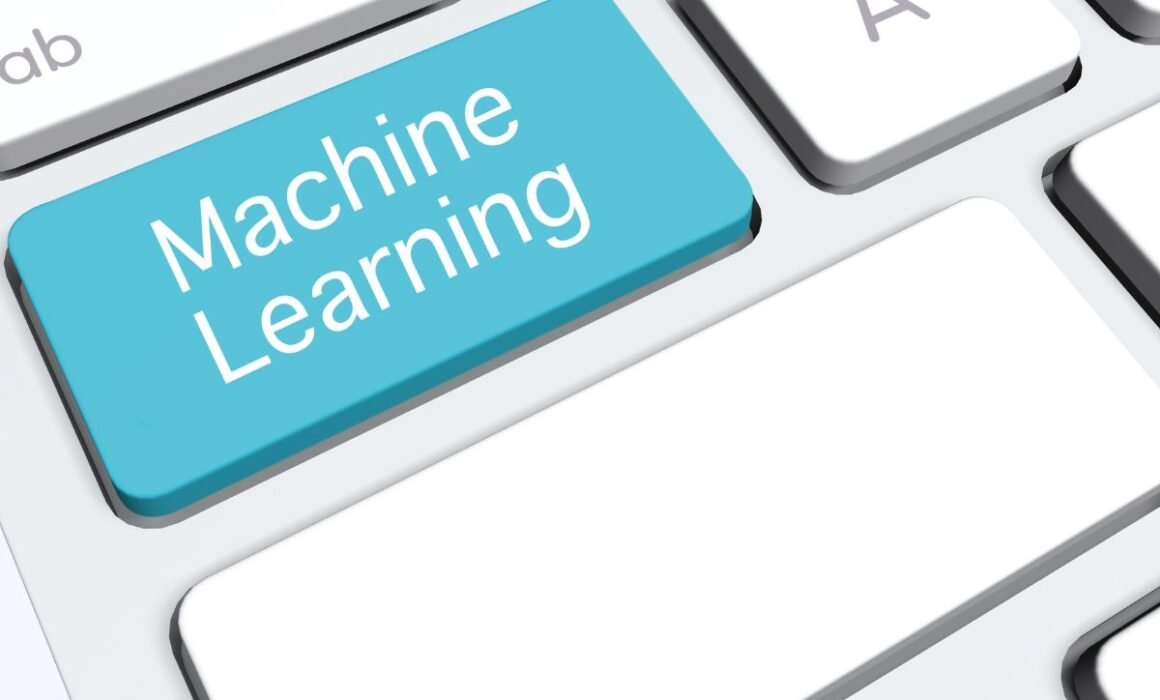What Are The Types Of Product Managers?
What Are The Types Of Product Managers?
Types of product managers vary, as the diverse world of product management has many unique roles, specialisations, and responsibilities.
As a product manager, you’re often the hub of the wheel, connecting and aligning various cross-functional teams to achieve a common goal: delivering exceptional products.
Dive into this must-read article to uncover the rich world of product management! Explore the different types of product managers, and discover where your passion and strengths truly lie. With this knowledge, you can confidently shape a gratifying career and make a lasting impact on your team and organisation.
Table of Contents
- What Are The Types Of Product Managers?
- The different types of product managers
- #1. Technical product manager
- #2. Analytics/data product manager
- #3. Digital product manager
- #4. Product marketing manager
- #5. Growth product manager
- #6. Design product manager
- #7. API product manager
- #8. UX product manager
- #9. Startup product manager
- #10. Consumer product manager
- #11. Enterprise product manager
- #12. Strategic product manager
- #13. Mobile product manager
- #14. E-commerce product manager
- #15. Hardware product manager
- Conclusion – what are the types of product managers?
- Machine Learning In Finance: 12 Essential Applications
- How To Create Interactive Compliance Training For Bank Employees
- How Fintech Apps Are Using Gamification To Increase User Engagement
- Top Gamification Companies for Employee & Customer Engagement
- The different types of product managers
The different types of product managers
#1. Technical product manager
Technical product managers passionately unite engineering and design teams to craft exceptional technology products.
Their crucial role ensures customer needs are met, priorities are set, and products exceed expectations through seamless collaboration and a solid technical foundation.
With their strong technical background, they effectively collaborate with development teams to ensure products are developed according to specifications, delivered on time, and meet customer expectations.
Characteristics
- Oversees development and delivery of technology products
- Works closely with engineers, designers, and technical teams
- Identifies customer needs and product requirements
- Ensures products meet customer expectations and business objectives
People with the following backgrounds usually do best in this role:
- Engineering
- Computer science
- Information technology
- Software development
Challenges usually encountered
- Communicating technical concepts to non-technical stakeholders
- Keeping up with evolving technologies
- Balancing technical feasibility with business requirements
Salary
According to Glassdoor, the average compensation for a technical product manager in the United States is $95,627 annually.
Source: salary.com
#2. Analytics/data product manager
Analytics or data product managers are the unsung heroes in the world of data-driven products. Their collaboration with data scientists and engineers is vital in shaping the future of analytics.
This product manager oversees the entire data management process, expertly identifies customer needs, and defines product requirements. Their dedication to implementing the right analytics tools and maintaining data accuracy is commendable, as it paves the way for businesses to thrive in today’s data-driven landscape.
In a data product team, two primary areas of focus usually divide their responsibilities. Some people prioritize model performance over other factors. Alternatively, there is a pole that is mainly accountable for enhancing activation performance.
Regarding two different tasks, one involves ensuring that they are precise and productive, while the other involves ensuring that they are utilized in the best possible way.
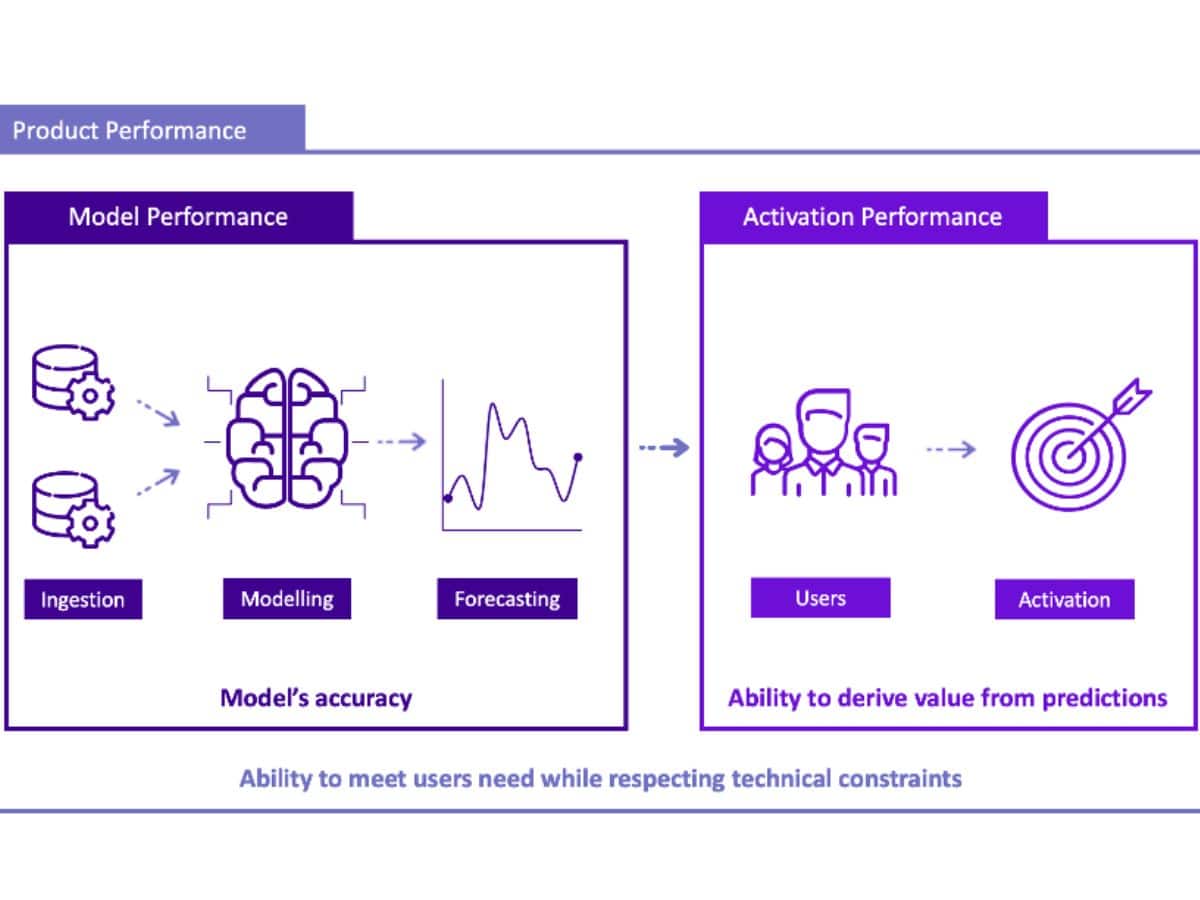
Image source: castordoc.com
Anyone who enjoys dealing with numbers might consider a career in data product management.
Characteristics
- Develops and manages products that rely on data and analytics
- Collaborates with data scientists and engineers
- Identifies customer needs and defines product requirements
- Ensures data is accurate, reliable, and meets business needs
People with the following backgrounds usually do best in this role
- Data science
- Statistics
- Business analytics
- Economics
Challenges usually encountered
- Handling incomplete or inaccurate data
- Ensuring data privacy and security
- Making data-driven decisions with qualitative factors
Salary
In the United States, data and analytics product managers can expect to earn an estimated total pay of $153,656 per year, with an average annual salary of $115,324.
Source: glassdoor.com
#3. Digital product manager
A digital product manager is accountable for creating, administering, and enhancing digital products within an organisation.
This position ensures digital products align with the company’s objectives and satisfy user requirements while maintaining a market advantage.
In order to succeed in this specific profession, professionals must possess expertise in three distinct areas:
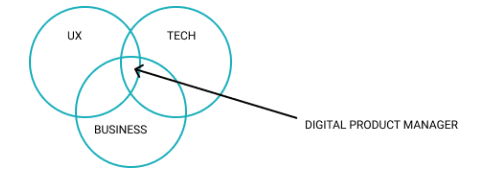
Image source: Inesdi.com
Characteristics
- Manages and develops digital products, such as mobile apps and websites
- Works closely with designers and developers
- Identifies customer needs and product requirements
- Ensures products are user-friendly and meet business objectives
People with the following backgrounds usually do best in this role
- Digital marketing
- E-commerce
- Web development
- Online business strategy
Challenges usually encountered
- Keeping up with changing digital trends and user behaviour
- Managing product performance across devices and platforms
- Ensuring seamless integration with existing systems
Salary
The average annual salary for a digital product manager in the US is $108,150.
Source: glassdoor.com
#4. Product marketing manager
As product advocates, they collaborate closely with marketing teams to promote and sell products. By conducting thorough market research, they gain insight into the needs and preferences of customers, enabling them to develop effective marketing campaigns and strategies.
Their expertise lies in positioning products in a way that generates revenue, driving success for the business.
Characteristics
- Promotes and sells a product
- Collaborate with the marketing product team
- Conducts market research to determine client wants and desires
- Develops marketing campaigns and strategies
People with the following backgrounds usually do best in this role
- Marketing
- Communications
- Advertising
- Public relations
Challenges usually encountered
- Differentiating products in crowded markets
- Measuring the impact of marketing efforts
- Coordinating go-to-market strategies across teams and channels
Salary
The average annual salary for a product marketing manager is $102,242.
Source: glassdoor.com
#5. Growth product manager
Transitioning to a growth-centric role, growth product managers pinpoint opportunities and implement initiatives to boost user acquisition, engagement, and retention. As a result, they play a vital part in expanding a product or product line
In recent years, the position of a growth product manager has gained popularity across multiple industries. Hotjar reports a substantial surge in search interest for the term “growth product manager”.
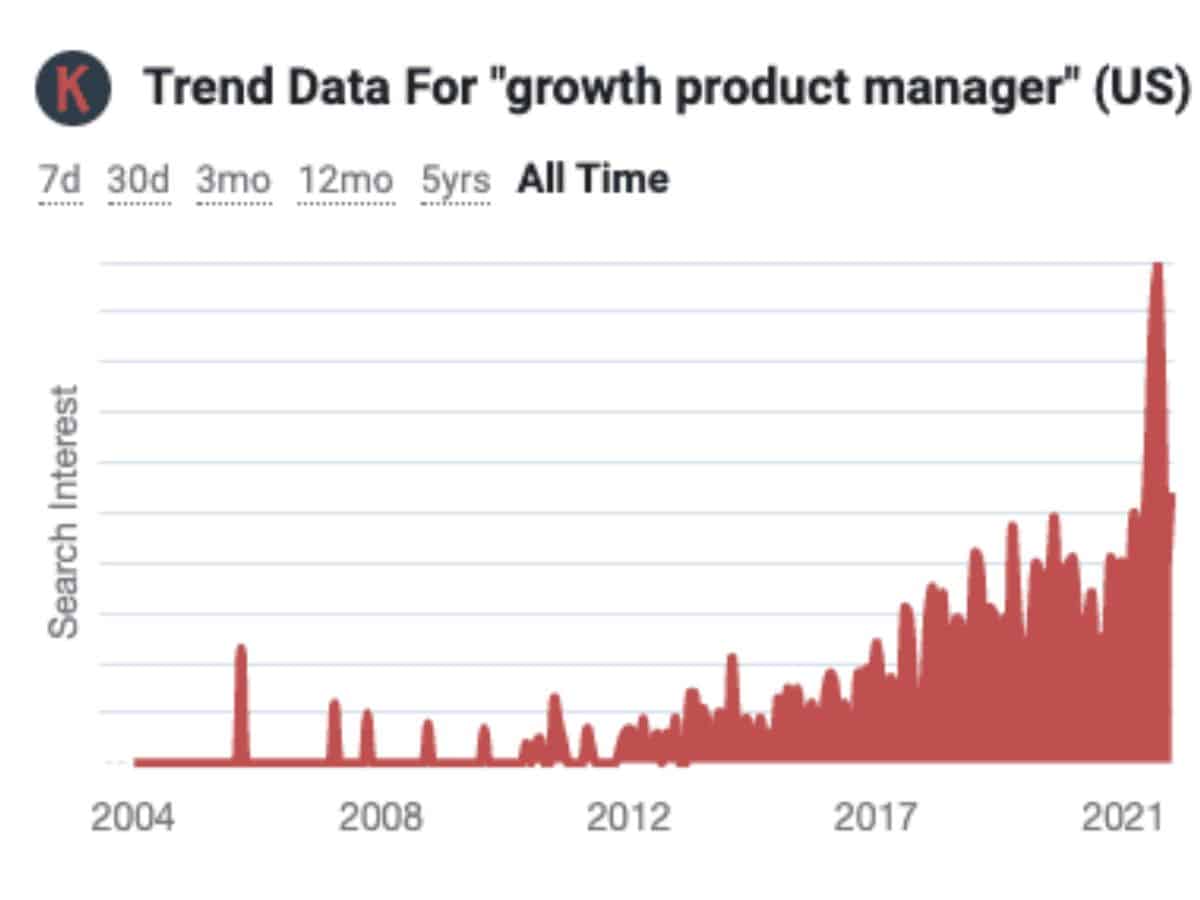
Image source: hotjar.com
Characteristics
- Develops strategies to drive user growth and engagement
- Works with product development teams
- Identifies user needs and develops new features and functionality
- Optimizes product experience
People with the following backgrounds usually do best in this role
- Growth hacking
- Digital marketing
- User acquisition
- Conversion optimisation
Challenges usually encountered
- Identifying sustainable growth opportunities
- Managing trade-offs between short-term growth and long-term retention
- Scaling growth initiatives while maintaining product quality
Salary
The average annual pay for a growth product manager in the US is $97,008.
Source: glassdoor.com
#6. Design product manager
Design product managers interact with designers and developers to build aesthetically appealing and user-friendly products, guaranteeing a seamless and engaging user experience.
Characteristics
- Manages the design process from concept to launch
- Works closely with designers and developers
- Identifies user needs and product requirements
- Ensures product is visually appealing and meets user needs
People with the following backgrounds usually do best in this role
- Design
- User experience (UX)
- Graphic design
- Interaction design
Challenges usually encountered
- Aligning design decisions with business objectives
- Managing user feedback and iterating on designs
- Navigating trade-offs between aesthetic appeal and functionality
Salary
A design product manager’s annual pay in the United States is $117,444.
Source: glassdoor.com
#7. API product manager
Serving as the lifeblood of seamless digital experiences, API managers work intimately with engineers and developers.
As a result, they deliver user-friendly, dependable APIs customized to cater to their audience’s needs. Their dedication fuels the connections that power our digital world.
The API product manager plays a crucial role in bridging the gap between two distinct categories of developers – the API consumers and the API producers.
As depicted below, this pivotal position acts as a conduit, facilitating smooth communication and collaboration between the two groups.
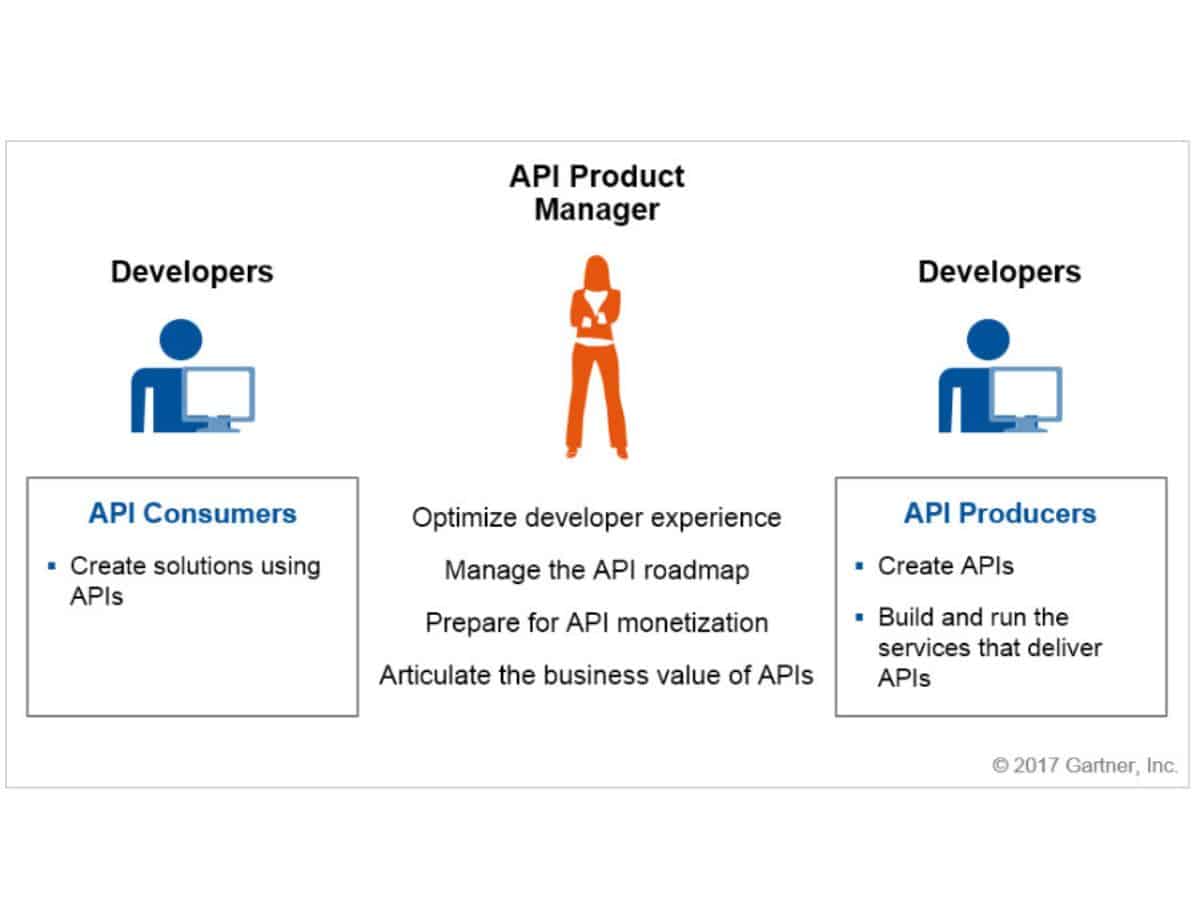
Image source: Linkedin
Characteristics
- Manages development and delivery of APIs
- Works with engineers and developers
- Ensures APIs are user-friendly and reliable
- Integrates APIs effectively with other products and services
People with the following backgrounds usually do best in this role
- Software development
- API development
- Systems integration
- Backend engineering
Challenges usually encountered
- Ensuring API performance, reliability, and security
- Maintaining backward compatibility and versioning
- Meeting the diverse needs of developers and partners
Salary
An API product manager in the United States can expect an estimated salary of $122,612 annually.
Source: glassdoor.com
#8. UX product manager
Emphasizing user experience, UX product managers prioritize crafting intuitive, enjoyable, and user-friendly products. Consequently, they collaborate closely with designers and developers to refine and optimize the user journey.
As depicted in the image below, good UX management cultivates a user-centred design culture, which in turn fuels organizational innovation.
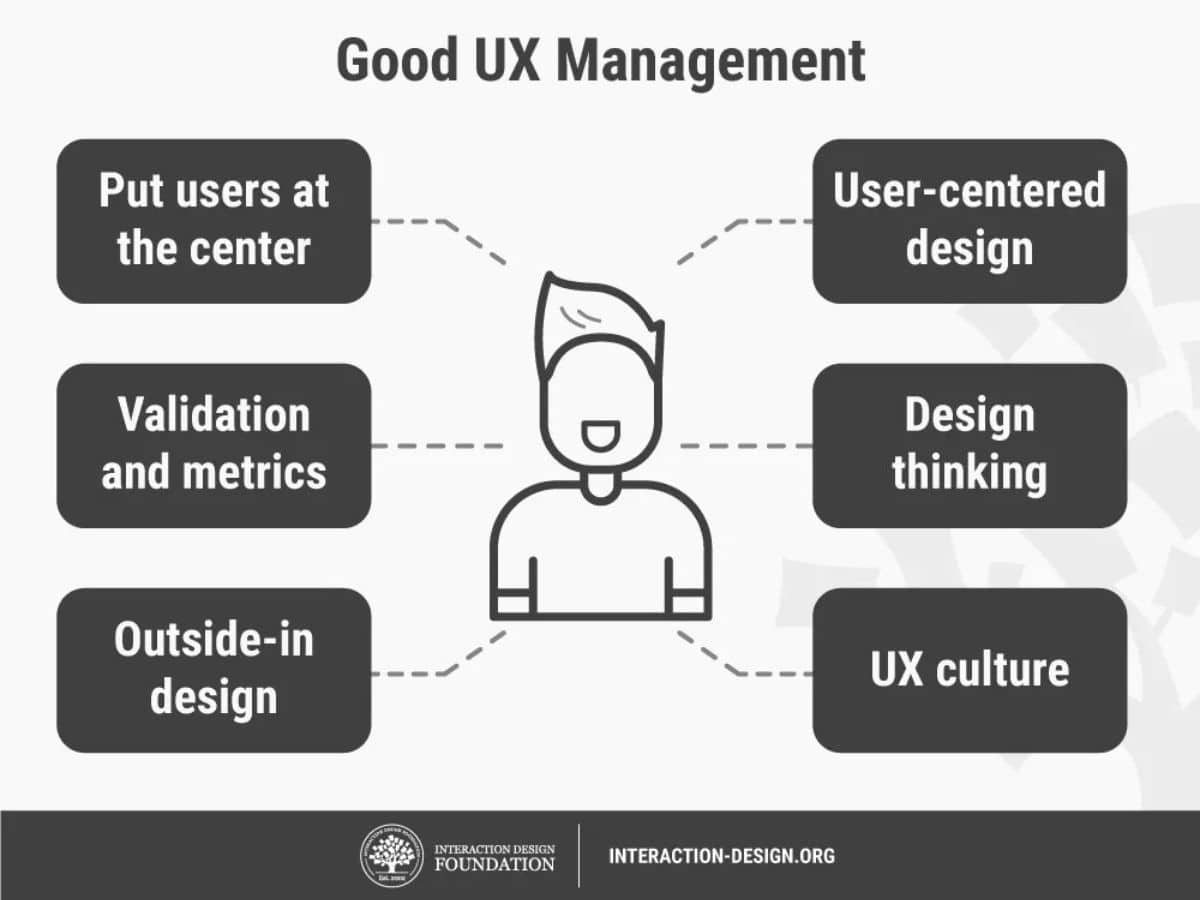
Characteristics
- Manages user experience of a product
- Works closely with designers and developers
- Identifies user needs and product requirements
- Ensures product is easy to use and meets user needs
People with the following backgrounds usually do best in this role:
- User experience design
- Interaction design
- Usability testing
- Human-computer interaction
Challenges usually encountered
- Reconciling user feedback with business goals
- Ensuring a consistent user experience across features and platforms
- Advocating for user-centric design within the organisation
Salary
The average annual salary for a UX product manager is $120,540.
Source: glassdoor.com
#9. Startup product manager
Within early-stage companies, startup product managers embrace a multifaceted role, handling diverse responsibilities and overseeing various technical aspects of product development.
Moreover, they skillfully adapt to the unique challenges within a startup ecosystem, guiding products from conception to deployment.
Characteristics
- Develops and delivers products for startup companies
- Works with founding teams
- Identifies areas for growth and development
- Develops strategies to attract and retain customers
People with the following backgrounds usually do best in this role
- Product management
- Marketing
- Design
- Engineering
Challenges usually encountered
- Managing limited resources and budget
- Navigating high levels of uncertainty and risk
- Prioritising and making trade-offs between competing demands
Salary
The annual salary for a startup product manager is slightly above $116,000 in the US.
Source: producthq.org
#10. Consumer product manager
A consumer product manager focuses on developing and managing products or services for individual consumers, ensuring they deliver value and meet user expectations.
The scope of their role includes
- Comprehending customer requirements.
- Establishing a product vision and strategy.
- Working collaboratively with cross-functional teams to create exceptional B2C products that resonate with customers.
Characteristics
- Strong customer empathy and focus
- Excellent communication and presentation skills
- Analytical and data-driven decision-making
- Adaptability and ability to handle ambiguity
People with the following backgrounds usually do best in this role
- Marketing, branding, or customer insights
- Consumer product development
- User experience design
- Market research
Challenges usually encountered
- Balancing stakeholder expectations
- Navigating a competitive market landscape
- Managing product lifecycle and iterations
- Ensuring consumer privacy and data security
Salary
The annual salary for a consumer product manager is $73,473 in the US.
Source: glassdoor.com
#11. Enterprise product manager
Enterprise Product Management entails collaborating with stakeholders to iteratively/innovatively support their business requirements through a defined product.
Characteristics
- Deep understanding of B2B market dynamics
- Strong analytical and problem-solving skills
- Excellent collaboration and relationship-building abilities
- Strategic thinking and execution
People with the following backgrounds usually do best in this role
- B2B product management or development
- Sales or customer success
- Business analysis or consulting
- Technical or industry-specific experience
Challenges usually encountered
- Aligning product goals with diverse stakeholder needs
- Managing complex sales cycles and customer relationships
- Staying current with industry trends and competitors
- Scaling product offerings for different customer segments
Salary
The estimated annual salary for an enterprise product manager is $149,309.
Source: glassdoor.com
#12. Strategic product manager
Strategic product managers define and execute product strategies, aligning them with the company’s goals and vision.
They analyse market trends, competitive landscape, and customer needs to identify opportunities and drive data-driven decision-making processes.
With their deep understanding of the business and industry, strategic product managers guide product development and ensure long-term success.
Characteristics
- Visionary and goal-oriented mindset
- Strong business acumen
- Excellent communication and negotiation skills
- Ability to synthesise market data and insights
People with the following backgrounds usually do best in this role
- Business strategy or consulting
- Market research or competitive analysis
- Product management or development
- Entrepreneurial or startup experience
Challenges usually encountered
- Aligning product strategy with company goals and resources
- Navigating market uncertainties and competition
- Balancing short-term and long-term objectives
- Managing stakeholder expectations and priorities
Salary
The average salary for a strategic product manager in the United States is $128,741 per year.
Source: glassdoor.com
#13. Mobile product manager
Their role involves developing and managing mobile applications and platforms in collaboration with developers and designers, focusing on delivering seamless user experiences.
Characteristics
- Deep understanding of mobile technologies and trends
- Strong focus on user experience and design
- Excellent problem-solving and analytical skills
- Agility and adaptability in a fast-paced environment
People with the following backgrounds usually do best in this role
- Mobile app development or design
- Product management or development
- User experience or user research
- Digital marketing or analytics
Challenges usually encountered
- Balancing feature development with platform constraints
- Managing app store guidelines and approval processes
- Ensuring app performance, security, and accessibility
- Staying current with evolving mobile technologies and user preferences
Salary
In the United States, a mobile product manager makes an average of $130,184 annually.
Source: ziprecruiter.com
#14. E-commerce product manager
Digital shopping experiences are their speciality, where they concentrate on optimising the customer experience and ensuring platform performance. Their responsibility spans ideation to execution, involving creating and managing online shopping platforms.
Their role involves:
- Understanding e-commerce platforms and technologies.
- Focusing on customer experience.
- Collaborating with cross-functional teams like marketing, merchandising, and operations.
Furthermore, they are crucial in ensuring the e-commerce platform’s security, performance, and scalability while navigating a dynamic and competitive landscape.
Characteristics
- Strong understanding of e-commerce platforms and technologies
- Customer-centric approach
- Excellent problem-solving and data analysis skills
- Collaborative mindset and cross-functional leadership
People with the following backgrounds usually do best in this role
- E-commerce operations or marketing
- Product management or development
- User experience or conversion optimisation
- Supply chain or logistics
Challenges usually encountered
- Balancing customer experience with operational efficiency
- Managing inventory, pricing, and promotions
- Ensuring platform security, performance, and scalability
- Navigating a dynamic and competitive e-commerce landscape
Salary
In the US, an e-commerce product manager makes an average of $105,575.00 annually.
Source: glassdoor.com
#15. Hardware product manager
A hardware product manager plays a crucial role in managing a company’s creation, development, and enhancement of hardware products.
This position focuses on aligning hardware products with the organisation’s objectives, ensuring customer satisfaction, and staying competitive in the marketplace.
The role requires business insight, technical know-how, and market awareness.
Characteristics
- Deep understanding of hardware technologies and manufacturing processes
- Strong analytical and problem-solving skills
- Excellent project management and organisation abilities
- Collaborative mindset and cross-functional leadership
People with the following backgrounds usually do best in this role
- Hardware engineering or design
- Product management or development
- Manufacturing, supply chain, or operations
- Quality assurance or testing
Challenges usually encountered
- Managing complex product development timelines and coordinating with various engineering, design, and operations teams.
- Navigating supply chain and manufacturing challenges, including dealing with suppliers, managing inventory, and ensuring quality control.
- Balancing product features, performance, and cost to meet customer needs while maintaining profitability.
- Keeping up with rapidly evolving technologies, industry standards, and market trends.
- Ensuring product compliance with relevant regulations and certifications.
Salary
The average salary for a strategic product manager in the United States is $106078 per year.
Source: glassdoor.com
Conclusion – what are the types of product managers?
Understanding the different types of product managers is vital for both experienced and new PMs. The variety of product management roles and specialisations offers many chances for growth, working together, and career improvement.
By learning about these types, you can better recognise your strengths, build your skills, and create a more satisfying career path.
Latest Posts
Machine Learning In Finance: 12 Essential Applications
The impact of machine learning on finance is significant. Thanks to this technology, financial institutions are now equipped to make efficient decisions. Through the analysis of data sets, machine learning […]
How To Create Interactive Compliance Training For Bank Employees
Banking compliance training isn’t just another task. It’s the stage where everything else performs. Banks must navigate a myriad of regulations and laws. After all, this is a trust-driven, high-stakes […]
How Fintech Apps Are Using Gamification To Increase User Engagement
Discover how gamification in fintech is revolutionizing financial engagement, making banking fun & boosting user loyalty.

